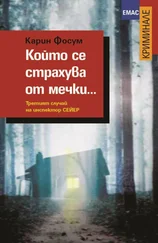“So she gave birth to a son?”
“Yes. She was sixteen at the time. He was born prematurely and was in an incubator for a long time. Eventually we took him home. But then Bonnie didn’t want to see him. She didn’t want to breastfeed him; she didn’t want to look after him. So I had to do everything. And then suddenly, sometime after the birth, she stopped eating. From one day to the next. Like a landslide. Henrik and I had our hands full and we quite simply gave up. It was the baby who had ruined everything and we didn’t want him either. So he was sent to a foster home, not far away. And we concentrated on saving Bonnie. She was under eighty-eight pounds by this stage. Later the little boy was formally adopted and given the surname Malthe. After Thomasine and Anders Kristoffer Malthe.”
“And did you have any contact with the boy over the years? Did Bonnie have any contact with him?”
“We couldn’t bear to. It’s a terrible thing to say, but we tried to forget the whole thing. I telephoned once to make sure that he was OK, but I didn’t tell Bonnie. Only he wasn’t OK — he had some kind of undiagnosed personality disorder. He would never manage on his own. His father found another woman and moved to Copenhagen. So it was just the two of them, Thomasine and the boy. And my conscience weighed on me even more, as if it were a punishment for what we had done.”
“But did you perhaps christen him before he was fostered?”
“We went to the town hall,” Henny told them. “It was a humanist name day. Bonnie came, but she didn’t dress up. She wore an old anorak and she didn’t say a word.”
“But she gave him a name?”
“No, that was me. His name is Eddie.”
“Eddie Malthe?”
“Yes.”
“And the father?” Skarre asked. “Did you ever find out who Jørgen was?”
“Oh yes,” she said. “I found him in the end. I had to see who he was, to know who had ruined so much of our lives. And when Bonnie finally met Olav and was happy and pregnant with Simon, she was able to tell us everything. She eventually told me his name, albeit reluctantly. He lived locally and of course he had his own family, so I got his number and called him right away.”
“What did you say to him?”
“That I wanted to meet him. That I wanted to talk to him about something important.”
“But you didn’t say what?”
“No, because then he might not have come. But you know, people are curious. So we arranged to meet in the shopping center, in Christiania Café. I got there early and was wearing a red silk scarf, so he could see me as soon as he walked in. And I sat there and waited. People came in all the time, but I didn’t see anyone who I thought might be Jørgen from all those years ago. I sat there a while longer, with a cup of coffee, and eventually a man came over to the table. He was calm enough, as though he had thought through all the possibilities. But I was shocked when I saw him. He was much older than Bonnie. And after we had spoken for a while and he understood who I was, it emerged that they had started a relationship when Bonnie was only fifteen and he was over thirty. He was already married and had two children. He hadn’t told her that, so he had betrayed her in every way. He’d promised her that it would be the two of them, but she had to be patient because he had some things he needed to sort out first. Then she got pregnant, and he panicked and left her. He said that he hadn’t realized that she had taken it all so seriously, but that he had often wondered whether she had given birth to the child. You are a coward, I told him. Irresponsible. Arrogant and egotistical. And he agreed. He asked me to give his best wishes to Bonnie, and I said that there was no way I was going to do that, and that he should stay away.”
“What was his name, Henny?”
“Jørgen Jonsson. He lives in Gimle. Do you need to talk to him?”
“Yes.”
A silence fell in the living room. Henny seemed nervous but relieved. She had no idea what the consequences of all this would be, but she knew that she had told them something important. She could see that they were on to something and that she had held them back. With her shame and her pride.
“He turned up at the funeral, didn’t he?” Sejer asked. “And you told him where to go. You were angry. What did you say to him?”
“That he should get out. That he had no business there.”
“Does Eddie know that he was adopted?”
“I hope for goodness’ sake that he does; he’s not exactly a child any longer. That’s the sort of thing parents should tell their children. And even if they don’t, they often find out. It’s their right to know, don’t you think?”
She went over to her husband by the window and stroked his hair. He turned toward her, but he had no idea what was going on. He wanted the strange men to leave; he didn’t know them. There was a tension in the room that he didn’t understand, something unfamiliar.
“Is it my fault?” Henny asked.
“No. But we have to talk to Eddie Malthe. Please take care of yourself and Henrik. And look after the graves.”
July had brought with it the longed-for summer heat. Bonnie and Simon were out walking in the fields around Geirastadir. They chose a path that ran along the edge of the woods, and Bonnie picked a bunch of wildflowers, dog daisies, bluebells, and clover. She had helped Simon make a big calendar with a square for every day from now until they went to Kenya in August. Each evening, he put a cross in a square and watched the time shrink. It was even more exciting than an advent calendar. He held his mother’s hand firmly, as he always did when they were out walking. Her hand was big and warm and safe.
They were getting close to Skarven Farm when Simon spotted the trailer between the trees. He stopped in his tracks and pointed. He asked his mother if anyone lived there, but she didn’t think so. The trailer was in poor condition with lots of rust around the windows and a couple of small steps up to the door. She could see some ripped curtains in the windows. Simon tugged at her hand because he wanted to go and look. Bonnie had to laugh. It was so typical of Simon — he loved small houses; he loved making tents with blankets; and he loved the little snail above his peg at daycare, with its house on its back. They opened the door and peered in. On the left were two narrow benches with a table in between. In the middle was a tiny kitchen space with a gas stove and shelves and a cupboard, and on the right were two beds with no bedclothes. The trailer had six windows and they were all dirty. It smelled stuffy and damp. Not particularly inviting, Bonnie thought, but Simon was not of the same mind.
“Can we spend the night here?” he asked. “Just one night?”
Bonnie knew he was going to ask that. And all she wanted to do at the moment was please him, her little munchkin.
“But it’s not our trailer,” she said. She looked up toward the farm at Skarven. “Maybe it belongs to the farmer. They’re probably waiting for it to be towed away because it’s just been abandoned here. Come on, let’s go and ask.”
The light blue Opel swung into the farmyard, so Eddie stopped and watched them from a distance. He thought that perhaps they wanted to buy some vegetables or berries. He decided to wait, for a while at least. But when the car door opened, he saw to his astonishment that Bonnie had two comforters in her arms. The farmer came out to speak to them. The boy jumped and danced around, tugging at his mother’s sleeve. He had a teddy bear under one arm and a small pillow with a blue case under the other. And then, for some unknown reason, they started to walk down across the fields and soon they were out of sight. Eddie slipped out of the car, found a path that ran past the back of the house, and then spotted them again, his mother and brother. I don’t care if they can see me from the windows, he thought, and looked up at the big white house to his right. When he got to the corner, he stopped. There, by the edge of the woods, was a trailer, and Bonnie and Simon opened the door and went in. They were going to spend the night there, he realized. Each on a narrow bed, the boy with his brown bear under the comforter. Maybe they would lie there and whisper to each other while they waited for it to get dark. She would probably tell him stories and they might even make great plans for the future.
Читать дальше












